PhD students within Information Technology
Below you can read more about the doctoral students in the doctoral education area of Information Technology.
Rabee Asous
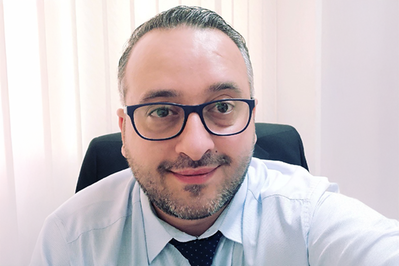
My research interests
My goal is to develop AI-supported decision frameworks that are both practically useful and aligned with principles of fairness, explainability, and stakeholder inclusion.
My dissertation project
As an Industry PhD student, I am researching how AI can support better corporate decision-making. In collaboration with industry partners, I explore how AI systems can be designed and implemented to enhance strategic choices, improve efficiency, and ensure ethical and responsible decision-making processes within organizations. My research focuses on integrating AI tools – such as predictive analytics, machine learning models, and decision-support systems – into existing corporate workflows, while addressing challenges related to transparency, trust, and accountability. As companies increasingly rely on data-driven insights, I investigate how AI can serve not just as a technical tool, but as a bridge between data, people, and organizational values.
Emmanuella Budu
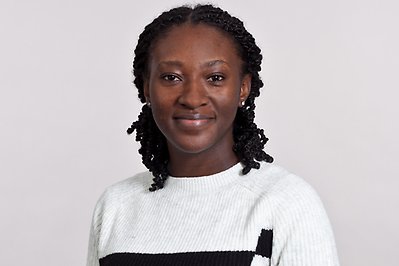
My research interests
I have a background in Computer Science and hold a Master of Science degree in the same field from the University of Botswana. My research interests lie in applying machine learning to drive advancements in disease diagnosis, improve treatment outcomes, and optimise service delivery in healthcare settings. I am most interested in developing AI-based solutions that can be implemented in real-world clinical environments.
My dissertation project
My dissertation explores how synthetic Electronic Health Records (EHRs) can be used to support healthcare applications. In recent years, synthetic EHRs have emerged as a promising solution to the challenges associated with accessing real patient data, which is often restricted due to privacy regulations. These synthetic records enable researchers to simulate clinical scenarios and train machine learning models without compromising patient confidentiality.
The main goal of my research is to investigate how synthetic EHRs can be made realistic and reliable enough to support disease modeling, healthcare planning, and resource allocation. By bypassing the barriers to accessing real EHRs, high-quality synthetic EHRs could accelerate innovation in healthcare, improve early diagnosis, and contribute to the creation of more efficient healthcare systems.
Savvas Eftychis
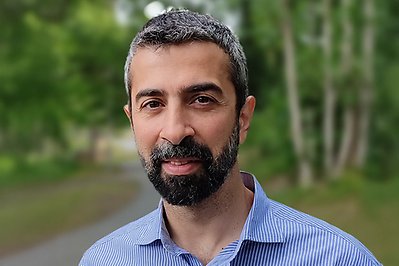
My research interests
My current research focuses on using machine learning for monitoring and enhancing engine system operations. I am particularly interested in detecting anomalies and faults by analysing sensor signals and physics-based parameters, as well as developing methods for the early prediction of engine failures.
I have a background in physics, with previous research experience in surface physics, nanoelectronics and semiconductors.
My dissertation project
Heat pumps are engines that transfer heat using electricity, and are used for heating and cooling purposes. My dissertation deals with fault detection and predictive maintenance for heat pumps. Our goal is to develop machine learning methods to continuously monitor heat pump performance, identify sub-optimal operating conditions, detect and predict faults, and perform root cause analysis. Optimising system performance will significantly reduce the energy consumption for heat pump systems. Early fault detection will enhance the reliability of heat pump systems by minimizing or even eliminating breakdowns, and root cause analysis will enable professionals to quickly identify and replace faulty equipment.
Veronica Granlund
My research interests
I am a full-time doctoral student in informatics with a background in digital design and maritime science. I am a member of the research program LeaDS – Learning in a Digital Society, where I focus on the design, development, implementation, and use of digital technology for learning in higher education.
My dissertation project
In my dissertation project, I adopt a design-based research approach to explore digital simulations as a tool for professional development in early teacher education. Digital simulations have the potential to offer student teachers a safe space for repeated practice and reflection, yet the technology remains underused in Swedish teacher education. My project involves close collaboration with schoolteachers, educators, and actors to create simulations that depict realistic classroom dilemmas and bridge academic knowledge with teaching practice. I focus on the design of both the simulations and the learning activities in which they are embedded, in order to investigate how digital simulations can stimulate first-year student teachers to reflect on the profession and begin to develop a professional identity.
I’m affiliated with the School of Education, Humanities and Social Sciences (LHS).
Camilla Häggroth
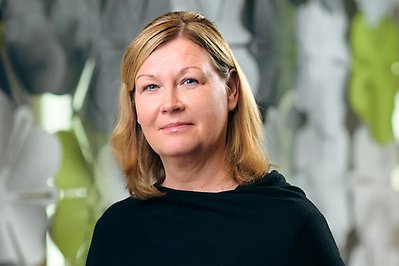
My research interests
I’m an industry-employed PhD student interested in how emerging technologies like AI and digital platforms can transform knowledge-intensive services, such as the legal industry, to promote greater accessibility and social justice.
My dissertation project
The purpose of my PhD project is to explore the intersection of emerging technologies and social justice, with a focus on the legal sector. The research will investigate how technological innovations such as AI-driven legal advisors, transforms legal services and contribute to increased access to justice. By studying the case of a large law firm, this research aims to understand how digital innovation can reshape institutional practices and address societal challenges. The overarching objective is to assess how emerging technologies can drive social equity while examining the broader implications of these developments within the legal industry.
Parisa Jamshidi
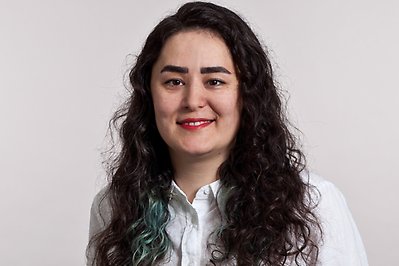
My research interests
My research interest lies in making machine learning and artificial intelligence models understandable for users. I focus on explainable AI (XAI), which aims to develop methods that explain how these models make decisions. My goal is to enhance the transparency of AI, ensuring that previously opaque models become transparent.
My dissertation project
My dissertation contributes to the field of explainable artificial intelligence (XAI) by developing more efficient explanation methods, evaluating the reliability of existing techniques, and proposing a framework for integrating intrinsically explainable models within federated learning. The research aims to enhance the transparency and trustworthiness of AI systems, particularly in predictive maintenance scenarios where understanding model decisions is essential. By balancing performance with interpretability, this project supports the development of AI solutions that are both practical and responsible for real-world applications.
Simon Norris

My research interests
I am a designer and cognitive scientist with over twenty-five years of commercial experience, including as the founder and CEO of an international strategic design agency. I hold degrees in human biology, human psychology, and cognitive science. My work explores the relationship between design and engineering, and its role in the development of artificial intelligence (AI). I bring a multidisciplinary perspective to contemporary challenges in AI.
I am currently a PhD student in human-centred artificial intelligence at the Department of Intelligent Systems and Digital Design. My research focuses on how designerly thinking and practices can be integrated into AI development processes to reduce negative externalities and unintended consequences associated with AI augmentation and integration. Drawing from my background in cognitive science and strategic design, I explore the intersection of design literacy, human-centred methodologies, and artificial intelligence – with a particular interest in how interdisciplinary collaboration can support the creation of more responsible and explainable AI systems.
Key areas of interest include:
- Human-centred artificial intelligence (HCAI)
- AI design methods and design literacy
- Interdisciplinary collaboration between design and engineering
- Responsible innovation and the unintended consequences of AI
My dissertation project
My dissertation investigates how integrating designerly thinking and methods into AI development can support the creation of human-centred, responsible AI systems. A core focus of my research is identifying and addressing the disconnects that often exist between designers and engineers—particularly in relation to design methods, vocabulary, and interdisciplinary collaboration. My work also contributes to the development of an AI taxonomy aimed at helping practitioners and educators navigate the complexities of human-centred AI integration.
Joel Nyholm
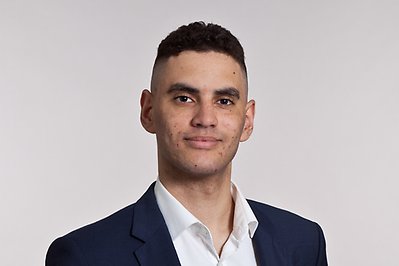
My research interests
My academic background is in Computer Science. My current focus is theoretical computer science, including program analysis, formal methods, and programming languages. My interest is in providing developers with tools and processes to help them make informed decisions.
I have a Bachelor’s degree in Software Engineering and a Master’s in Computer Science.
My dissertation project
My dissertation project aims to create a methodology to achieve verifiable energy efficiency of software. As energy efficiency is vital for many fields, from software on mobile devices to software in big data centres, developers need to have a verifiable manner to check the energy consumption of their code. The proposed approach uses a combination of program analysis and formal verification to create verifiable values. The method would enable developers to check if their code meets functional requirements, such as the program must consume less than X Joules or checking if newer versions of the same code consume less/more energy.
Daban Rizgary

My research interests
I have a Master’s degree in cognitive neuroscience, and a Master’s degree in cognitive science. Currently I am employed by RISE Research Institutes of Sweden working as a senior researcher within a group named Human-centered AI. My research focuses on Human-Vehicle-Interaction, and more specifically, I focus on vehicles with driving automation technology.
My dissertation project
My work aims to establish the role of technological explainability and user comprehension in acceptance (defined as intention to use) of automated driving technology. Research shows a lack of user understanding for increasingly complex automotive technology, which I hypothesise can create a bottleneck in users acceptance of vehicles with such technology. My work will explore this relationship with the evaluation of more explainable automated driving technology and human-machine-interfaces (HMI), aiming to 1) establish the strength of explainability as a predictor for acceptance and 2) demonstrate use of explainability frameworks as a means to enhance user comprehension and acceptance of automated driving technology and related HMI.
Abu Mohammed Raisuddin
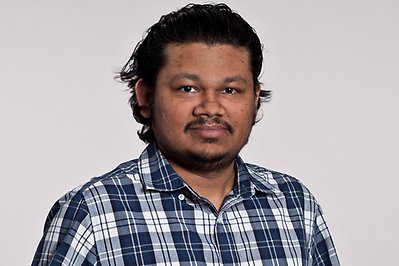
My research interests
My research interest is rather broad: I seek to discover knowledge that would benefit society using artificial intelligence (AI) based methods. I am a researcher with a very diverse career. I have five years of professional experience in Software Engineering and co-authored one article in this domain. I wrote my Master’s thesis on Multiple-Sclerosis Segmentation from human brain MRI scans using deep learning (DL), a subfield of AI. After my Master’s, I gathered three years of academic research experience in the medical image analysis domain using AI and authored two more research articles. In 2022, I started as a new PhD student at Halmstad University with a focus on improving Autonomous Driving Perception using AI-based methods.
My dissertation project
My dissertation project title is “Deep Learning for Autonomous Vehicles with Adverse Weather-Generated Noise (snow/ rain) Removal in Focus”. It is being carried out under the EU-funded RoadView project.
Autonomous vehicles require sensor data (e.g. from cameras, LiDAR, and RADAR) to make decisions on the road. Understanding the surroundings from these data is vital for the operation of AVs. Extensive research has been done in this domain, which resulted in the production of road-worthy AVs. However, these systems are not robust against extreme weather conditions (e.g. heavy rainfall or snow). As a result, there is a need to investigate these AVs under extreme weather scenarios. For scene understanding, state-of-the-art works depend on deep learning (DL). DL has been extensively studied for scene understanding and perception in AVs. Yet, for extreme weather conditions, scene understanding is still under-investigated. We hypothesise that removing adverse weather-generated noise like snow or rain will improve the underlying perception algorithms. To solidify our hypothesis, in this dissertation project, we aim to develop novel multi-modal DL techniques to remove adverse weather-generated noise to facilitate the perception and decision-making of AVs in extreme weather conditions.
Federico Valeri

My research interests
With my background as a mathematics and science teacher, my research interests are naturally connected to education, and more specifically, the role of technology in students’ learning of STEM (Science, Technology, Engineering, and Mathematics) subjects. I have always had a strong interest in programming, as well as in the role of computational thinking and digital literacy in students’ learning processes.
My dissertation project
My PhD project explores the integration of Large Language Model (LLM) chatbots in secondary STEM education, investigating the implications this newly introduced technology brings to classrooms. To understand the effects of LLM chatbots on student learning, we first need robust empirical data to shed light on how students and teachers perceive this technology as well as their knowledge about it.
I’m affiliated with the School of Education, Humanities and Social Sciences (LHS).
Felipe Valle
My research interests
I hold a Master of Science in Electrical Engineering from the University of Chile, with a specialization in Wireless Networking. My primary research interests lie in Vehicular Networks (V2X), with a particular emphasis on developing novel techniques and communication schemes aimed at enhancing user safety – for both drivers and pedestrians – as well as improving the overall efficiency of transportation systems.
My dissertation project
My dissertation focuses on proposing enhancements to the current European Telecommunications Standards Institute (ETSI) protocols for vulnerable road users (VRUs) within V2X communication systems. Specifically, it aims to develop a new framework for cooperative behavior and maneuver coordination through the sharing of driving intentions. This problem involves two main challenges: first, accurately predicting vehicular intentions – such as lane changes, overtaking, or emergency braking – based on a combination of the vehicle’s predefined route and its real-time kinematic state; and second, designing an efficient method for representing these predicted trajectories within V2X messages so that recipients can quickly assess potential conflicts and coordinate maneuvers accordingly.
Oliver Weberg

My research interests
I am a designer with a Master’s degree in Digital Service Innovation. In my design ethnographic research, I study the everyday experiences of communities to learn about local practices, and support these in change implied by technology.
My dissertation project
My dissertation project aims to highlight local practices as a way of supporting social sustainability, indicating a shift away from current ”people will adapt”-norms, and to bridge the gap between ways of doing and systemic design.
Naomi Buseko Zulu-Chikumbi
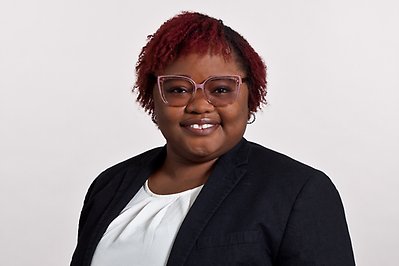
My research interests
I am a PhD student in Informatics with a strong inclination toward Information Systems at the Department of Intelligent Systems and Digital Design. I work within the LeaDS research programme on the project ”Guidance for Digital Automation and a Good Working Environment.” My background includes business management, digital transformation, research, and digital service innovation.
My dissertation project
My research focuses on the complex, interwoven relationship between humans and the machines they use, specifically, white-collar knowledge workers and intelligent technologies. I am exploring how these technologies implicate their professional competence and considering the implications for the future of work. I advocate for technology to complement and not replace humans in the workplace. Passionate about artificial intelligence, I foresee a future where technology amplifies human capabilities.
Alice Zupančič
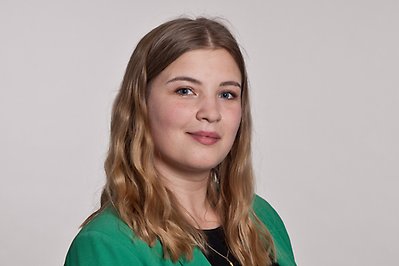
My research interests
I am a PhD student in Informatics at the Department of Intelligent Systems and Digital Design (ISDD), within the Learning in a Digitalised Society (LeaDS) research programme. My research focuses on technology-enhanced learning, particularly the integration of virtual reality (VR) to support learning in diverse contexts. I have a background in Early Childhood Education and Educational Technology, along with work experience as a preschool teacher and educator for children from adverse family environments and with special needs. This experience drives my commitment to research that is practical and context-driven, aiming to collaborate with participants to address pressing everyday challenges.
My dissertation project
My research centers on the development of sustainable solutions for the integration of virtual reality (VR) into teaching practices. The project is conducted within a distance-based educational programme for students in grades 6–9 who have been absent from school for extended periods due to psychological, social, or medical reasons. VR has shown promising potential for enhancing learning and could be particularly beneficial in this context, offering an immersive way for students to interact with content and stay connected to their education remotely. However, to fully harness these benefits, it is crucial to provide teachers with the necessary support and resources for effective integration and implementation of VR technology in their practice.

